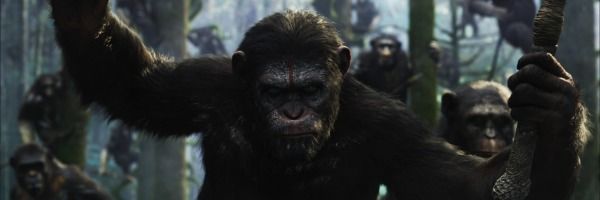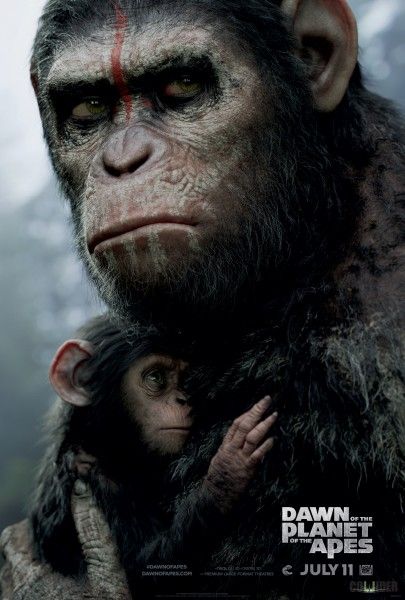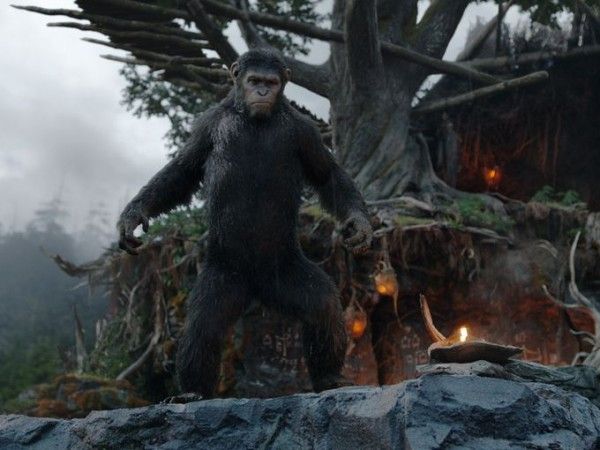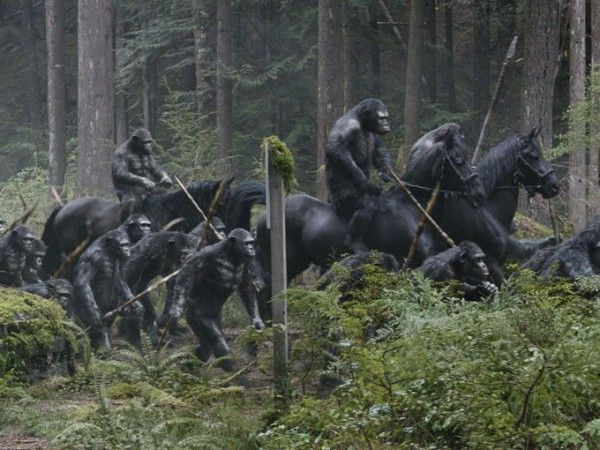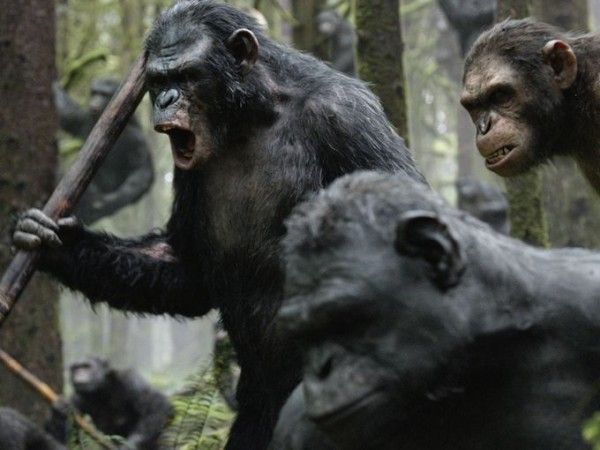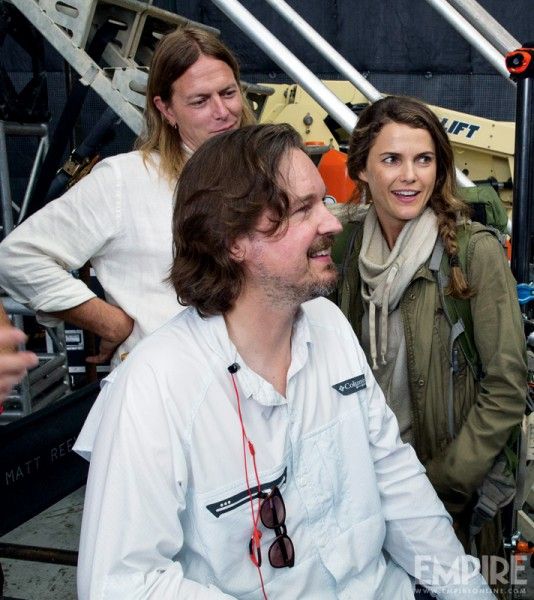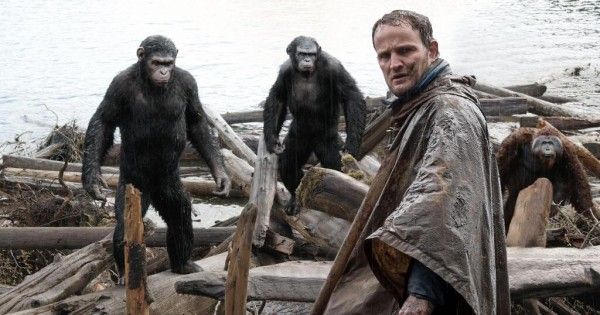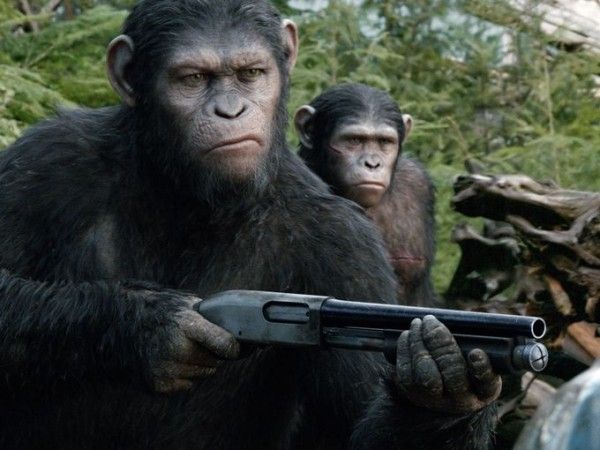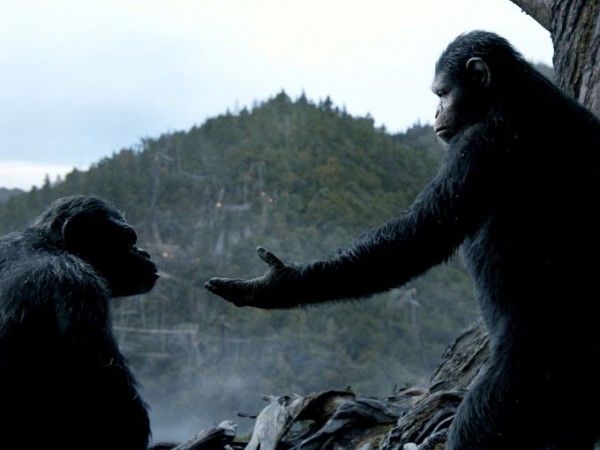While I love getting to talk to the actors and director on a film set, one of the people I always want to talk to is the producer. Because while the actors can talk about their character and how things might have changed along the way, the producer knows all of the behind-the-scenes stories and can go into a lot more detail about a movie's journey from page to screen.
Last year, when director Matt Reeves' Dawn of the Planet of the Apes was filming in New Orleans, I got to visit the set with a few other reporters. At the time I thought the film was going to be something special, but as you have heard me say the past few days, the finished film is even better than I imagined. On the set producer Dylan Clark talked about bringing in Reeves, the Apes franchise, the challenges of making the sequel, motion capture, balancing the human and ape story, and so much more. If you're curious how Dawn of the Planet of the Apes came together and what it was like on set, you'll enjoy this interview.
Question: At what point after Rise did you know Dawn was happening?
DYLAN CLARK: Well, many answers. The truth is, I always felt like Rick and Amanda’s idea on the script was to do a whole proper reboot, which meant not just three pictures, but as many as the characters demanded. Because I worked at a studio for most of my life before I started the company with Peter and started producing. You now see people remaking movies three years after the original. When I was at Universal, for instance, we did the Ang Lee Hulk, and then we did the Marvel Hulk maybe four years after that. And that made me realize that the studios felt most comfortable with branded IP -- and the audience too. They wanted it done properly. I get a little bit frustrated as an executive and as a producer and as a consumer to see things in that shortened cycle. This is a good idea -- it’s a contemporary Apes. There’s no reason you can’t have -- I used to just say eight because it was a made up number and it sounded good -- but you certainly didn’t have to limit yourself to three. But when you’re making a movie like that, you don’t think, “Oh, we’ve got this one in the bag.” Obviously we ended the way that we ended in case there was a sequel, and it was always important. I’d say to [director] Rupert [Wyatt] all the time, “God, we’ve got to get them off the bridge and into the woods, because they have weapons, and apes don’t have weapons yet. There’s no parody at all, so let’s just get them across the bridge so that we can figure out for the next one how the world feels a little bit more balanced and that you can have a real conflict.” That was important to me, the next big conflict. It also ended the virus story, I thought, pretty well. So it ended the first story, but it also definitely set up for the next, so that you knew humans were going to have to deal with something and that the apes were going to just be an afterthought. It wasn’t like -- just in that moment in time they were pissed off at a bunch of mutant apes that got across the bridge and maybe killed some policemen. But then their attention was going to go into a bigger pandemic.
And it’s also kind of in keeping with the Apes tradition of having sort of a twist ending.
CLARK: Yeah, again, it was more to me about the practical and pragmatic kind of shoring up the story and setting up for the potential future in a way, again -- even on the bridge, we strained credulity; I mean, this helicopter comes with a 50 cal and starts spraying bullets. You’re like, “Oh, Caesar, how are you going to get out of this one?” And he does, but you try to do it as -- and I’m sensitive, because I have three boys, 11, 9 and 7, and they’re going to go see this movie. So you’re sensitive to the gun violence and those kinds of things. But that’s the story. There’s going to be a battle on the Golden Gate Bridge, and there’s going to be shooting at apes, but you don’t want to see a bunch of apes massacred. So then you start thinking about the future. Also, it’s always through character. Rupert was great about that, and Matt’s great too. All of the decisions, the behavior, the plot choices come through character. Caesar’s not about killing a bunch of humans. In the first movie, he wants to get them out for freedom and to create a home. That was the trajectory of the journey, and it wasn’t about killing a bunch of humans with guns -- although he will fight back if he needs to. We also didn’t want to make him a wuss. We wanted to make him strong. That character is not afraid of fighting back, but he’s not looking for a fight. He’s not looking to kill somebody. But he did give Koba the nod to [Laughs] -- as long as we’re splitting hairs! Andy did not like that, because he wanted Caesar to take the high road. Initially, there were all kinds of thoughts, and I was of course the producer and said, “Well, you know what? Jacobs is there basically there creating this problem for apes, so he has, to me, cause to kill this guy.” He even killed his mom in some way, but logically, practically in the movie, Caesar doesn’t know that. And Andy was like, “Caesar doesn’t know this man. Is he just going to kill him?” I was like, “I don’t know. What can we do?” So, “You know, Koba, he did some bad shit to you. You take this one.” He didn’t know, he just kind of turned his back. “I don’t know what Koba’s gonna do.”
The James Franco and Freida Pinto characters aren’t in this one. Was that always the intention from the start of development, or did that grow -- even though it shows...?
CLARK: I mean, they’re the ones that died. They were ground zero of the virus. The truth is, in the first script, James dies. There was an ending shot with James not making it.
Oh, it was even shot?
CLARK: Oh yeah. It was shot both ways.
I think that story came out.
CLARK: Yeah, it did, and it’s not really a story. The truth is, we didn’t go with it not because it was a bummer ending. It was actually the right thing. When we developed the script it was Dr. Frankenstein -- he must be punished for his involvement. He’s culpable in this whole thing. So it seemed narratively correct. The staging of that was just, really, we just had one of those bad days. When we were shooting, it just didn’t -- it was hokey. It was hokey, the way he died. It was just lame. Even Rupert said, “Oh, this is lame.” Also, we didn’t have the right goodbye in the way he died. Again, he had to say sorry to his son. That was clearly what we needed. He was unable to get Caesar out of prison, you know? And Caesar had to learn that horrible lesson, that he couldn’t rely on humans -- that in matters that were grey, it was going to be all about him. That was a big moment. James comes to get to him out, and he’s holding the leash. Caesar sees the leash and he goes, “Oh, you fucker. You fuck.”
Do you think it also speaks to the success of Rise of the Planet of the Apes’ ending and Andy’s performance and what you guys have done with performance capture that you don’t need to bring Franco back?
CLARK: I think all of that helps. I think, again, you’ve just gotta stick with the basic story and go from there. When the first script was written, it was “Dr. Frankenstein did this, and he’s gotta pay,” and the virus is going to take care of how many -- but that was the story, that the apes live and the humans in our world don’t make it.
You talked about establishing a bunch of films. Are you planning for that? Are the characters you’re establishing human-wise in this going to last longer than James? Or is this the apes’ story?
CLARK: It is definitely both. It’s the apes’ story, and it’s the humans’ story. We have endings for them -- some die, some don’t -- but, again, we’re always looking at the movie in front of us. We really are. That’s rule number one, and you guys know this better than most. You guys see these movies. If you don’t properly tell your movie with a proper ending and it feels like you’re setting up for another movie, the audience hates you for that. We’re not doing that. So really, not to be careless, we’re not thinking for the future in that way. We just want to -- and all the people here are signed up to do the right thing and end it in the right possible way. I think we have a great ending. I think that this is a great story. It was a long way around the park to get here... but it’s a really good story. It took Matt [Reeves], as I say, it took an outsider from us to come in and sort of tell us, remind us, what we did really well on Rise. It’s funny, I always say this, and Matt is such a good pitcher. This is a tough day, and tomorrow’s really hard; he’s got to prep for tomorrow. But he had this interesting word, which was “grappling.” He loved how Caesar in the first movie was grappling with his intelligence, grappling with his situation, grappling with his new adulthood, grappling with what it means to be a leader. In this second movie, we’re seeing pieces of that again. You know, there were many early drafts where it was so easy to just write the Charlton Heston movie, meaning, like, apes were walking around going, “Hey, Jim. How’s it going? Good to see you.” We’d be like, “Whoa, whoa, whoa. We’re missing a big chunk of what was good about the movie.” You know, Caesar piecing together, grappling with things around him that would allow for him to be proactively better than humans. So we wanted to do that next. We didn’t want to go 50 percent, we wanted to actually go 15 to 20 percent in their intelligence. Their intelligence is how they express it, how they deal with it. We want to see them kind of working stuff out. The truth is, what was really good for our narrative is they had zero interaction with humans. Most of these apes, the older ones, had interaction -- the Rockets and the Kobas and the Caesars -- but a lot of the new apes, they just know the woods is home. Humans were this thing that kind of screwed it up. They hear about it from Maurice, they hear about it from Caesar. They know it’s real, too, because this has gone to shit, as they’ve seen. You’ve seen the sets. Side note: I was the executive on Children of Men, which was not a commercial movie, but to me it was one of the great, cool sci-fi movies. And I think had we had a better, more commercial idea with Children of Men, I think more people would have gone. I think most people found it a bummer and decided not to see a movie about the last pregnant woman. I don’t know why, but people are still talking about it.
On a separate note, most people think it’s one of the best films of that year.
CLARK: But that’s not a hard thing, right? It’s how do you get them out of the house to go see these movies? We couldn’t do that on Children of Men, and I can’t blame marketing for it. It was a very tough sell. People, when they heard the idea, didn’t want to choose it. Apes, of course, they have a lot of understanding from the original Apes. I think Rise was accepted pretty big. We did big numbers in the box office, and I think there’s generally a big good will for Caesar and what he’s doing next. And I like that we took the tone of this movie slightly edgier, slightly darker, a little bit cooler in my opinion, more realistic, grounded. So you’ve got kind of grounded, world sci-fi with talking apes, which to me, what’s better than that?
So Franco’s not back. His relationship with Caesar is a father/son relationship in that movie. What’s the relationship like between Jason Clarke and Caesar in this one?
CLARK: There’s an uneasy -- “alliance” is probably too strong a word. They’re adversaries at the beginning because there’s humans and then there’s apes, and there’s not a lot of trust going on. And they have to figure out how to work together in an uneasy alliance, and then they become friends. You know, Caesar has had a great experience with humans. He was loved by Will and Charles, and he’s seen good in humanity. Other apes have not. So from his point of view -- that’s why he’s the leader: he can see a lot of different sides. He also sees, as he comes into this area of California, he sees the desperation that humans are living under, and he knows what they’re trying to do, and he knows it’s serious. He knows that if he doesn’t help out now, then he and the apes are probably in a worse place. So you get to see him grappling with these decisions. Do you go to war? How do you avert war? What’s the best way to thread the needle? And that’s what this movie is about.
Obviously it’s great that Matt Reeves came on to direct the movie, but Rupert was originally supposed to direct it and that fell apart. Was that a bit disheartening to lose Rupert after he did such a great job with the first one?
CLARK: Disheartening, yeah. Rupert is a dear friend of mine, and we really had no idea that when we made that first movie together. We had never really even seen a real-life shot from Weta with the performance capture. That was us just jumping off a cliff and trusting that these guys were that good -- which, we had some evidence that they were that good, but still we’d never seen that. We didn’t know if it was going to work. It could have looked like a humanzee. We just didn’t know. So going through that with the director -- and a young director -- that experience I’ll never forget. That was one of the best movie experiences of my life. And he’s such a good director and a great, visual storyteller. So I was bummed out that we couldn’t figure out our schedules. Going through a movie like that, one of the things that everybody forgets is directors want to do a lot of different things. Just doing these kinds of movies takes a lot out of you. He had just had a new baby. He’s never off the clock. Once Matt leaves, he’ll be up until one o’clock doing stuff. He’ll be in the editing room. It’s relentless. And the post on these movies is just brutal. So I think Rupert was feeling that too. His first movie, The Escapist, was a $3 million movie, and I think he has many different interests. He constantly just wanted to try and squeeze in something smaller first, is the truth.
As a producer, how do you feel about the way studios have been going? Like the way that played out with changing from Rupert to Matt Reeves, and then we just recently saw at Universal Justin Lin walk away from The Fast and the Furious, and now James Wan’s doing the next one because the studio wants the next one so quickly. The turnaround on this movie is pretty quick. Do you feel pressure as a producer meeting the release date?
CLARK: Yeah, you always do, and you do as an executive and as a writer and as a director, and I think you do as a consumer too. You understand from a business standpoint why the studios want them so quickly, and I do believe you want to strike while the iron’s hot. But you also don’t want to go off and make a bad movie, especially when you’ve done so well with the first one. So it’s a lot of balancing. You always want to have options. So if they have the release date -- and again, this is no new thing. 20 years ago, when I had my first studio job, distribution was driving it still. You know, “We need to fill these slots. These are our big slots. Let’s get them going.” The producer’s job is to go out there and do your best and put the thing together and see what it is. If you don’t have the goods, you have to say to the studio, “Hang on a second, guys. We don’t want to screw this up.” Luckily, Matt was a huge fan and was able to step right into the schedule with a totally different story, which is great. Again, it was a quicker in-the-future look at what the apes were doing, and it wasn’t so far down the road. I think there’s an interest to see what were the apes doing, you know, that last shot of Caesar going up the tree and looking out at the Golden Gate. What have they been doing? To see that in progress rather than see it realized I think would have been a bummer for the audience.
How many more visual effects shots does this one have in comparison to the first one?
CLARK: A lot more. That first movie, we had one ape in the first act of Rise. Then, act break, we went into the jail and met more apes. So we have considerably more ape shots.
Do you feel better about this one, or is your position as producer just, every time there’s an Apes movie you’ve gotta push the technology until you get nervous?
CLARK: No, see, I never feel nervous about technology at all. I was nervous a lot about the 3D, to begin with. But I have no anxiety about Weta at all. Their motion capture has gotten better. We have a couple more tools to play with, and I’ve seen some early tests that are mind-boggling. They’re so good. We had trouble with our secrets. We had trouble with legs. We had trouble lips -- real trouble with lips on the last one. We’ve worked those out. But -- can I give spoilers? -- there’s a little more talking in this movie. They’re not going, “Hey, Jim. How’s it going?”
These guys know that they’re at the stage where they’ve been developing sign language to a different extent and they’re starting to vocalize.
CLARK: In Matt’s words, we’re grappling. We wanted the communication to be everything, right? In the first movie, they sign and gesticulate, and then Caesar speaks. So we took it that there would be some -- and Koba writes Dr. Jacobs’ name, so he obviously knows things. So they’re smart, and they know language. We wanted to play with all that stuff. So we went out there and did two things very smart, I think. We talked some more proper actors into being in our movie -- not that our actors from the last movie were bad, but we went and found some real talent. Then we also went out and found some physically skilled amazing guys that do things that I’ll never understand. That was the other thing. We had a really hard time -- and you guys will tell me -- but in Rise, any time they were off the earth, you felt the visual effects, the gravity left. And that’s the hardest thing for the motion capture artists to do, the guys that sit in New Zealand and do it, because the performance now all of the sudden is just a visual effects shot, and that’s gone. It’s the artist’s rendering, and it just doesn’t feel as real as when you see Andy sitting there acting in a performance or doing some physical stuff that humans can do. But the truth is, our stunt guys on that last one -- I mean, they were great -- can’t do 25 percent of what these guys can do. We have a shot in Vancouver of one of our guys jumping 25 feet down an incline. He’s hopping and just goes for it. And that will be in the movie in a way that we can never could have achieved in the last movie. It’s so fucking cool. I love that shit.
What was different about your initial plan for the sequel? Changing between directors, what did Matt decide to change of it?
CLARK: I’ll only say that, again, what we forgot that Matt reminded us of was, let’s go into this place midstream, in progress, you know, that they’re grappling. They’re not there. There’s much more of the ape community. More of the Rupert -- we had Scott Burns writing, and I was involved in the breaking of the story -- there was a lot more stuff in the city. Now it’s kind of parceled out. It’s balanced.
The first film had the Icarus and a bunch of callouts to the classic series. Are we going to see anything like that in this one?
CLARK: Well, do you want to see that? I believe that people don’t want to see too much of that. I believe that they didn’t like the “Take your stinkin’ paws off me.”
I liked the Icarus. I didn’t care for that as much.
CLARK: Yeah, I didn’t like that either. A former head of the studio demanded that line. [Laughs] You know it’s true too. I was like, “I promise you, we’re gonna get killed.” “We just have to have this one line! You have to have this one line!”
Are you saying to me that Tom used to suggest things that would go into stories and scripts?
CLARK: The Icarus was good. Again, had we done our jobs right with Rise and we could put together a series of movies that suggested how Planet of the Apes became Planet of the Apes, why not throw the Icarus in there? And that’s what we did.
Caesar playing with the Statue of Liberty puzzle was cool too.
CLARK: That was subtle at least.
Yeah, it was a nice touch.
CLARK: Yeah. There’s always the twist ending thing, you guys say. Again, that was what Burton did wrong I think. It was all like, “We’ve gotta go to a twist.” If it doesn’t come out of story and character, the twists are just going to feel like artifices. It’s just an artificial kinda bullshit thing. Then you go back to the original, and people are going to see these movies because they want something different and they want something new -- I think.
Would you say that half the movie takes place with the humans and half the movie is with the apes?
CLARK: Basically, there’s parody in terms of screen time and character in this movie. You know, the guy on the poster of the last movie is the same guy on the poster of this movie. Don’t tell Jason Clarke that. Jason has a big role in this movie, as does Gary.
I’m just wondering, is it 50 percent on humans?
CLARK: It’s close. But there’s some serious stuff going on in the ape world, and there’s some serious stuff going on in the human world. Then they clash, and then they’ve gotta figure their shit out together. Then it’s basically Dawn of the Planet of the Apes.
Last question? I love Matt, and I love what he did with Let Me In and that whole sequence with the car. Is there anything that he’s brought to this film that’s a sequence that is going to be that kind of thing.
CLARK: He’s brought so many, it’s ridiculous. We had a great crew last time. I think we’ve gone above and -- we’ve bettered ourselves in many ways. Seresin is a giant DP. I love him. Again, I did Children of Men with Alfonso. Alfonso, when he’s not using Chivo, he uses Michael. Just the quality of his light. We’ve got incredible operators so that Matt can design shots. I hope we pull this off, and if we do I think you guys will be reminded of this conversation when I said there is some cool shit in this movie. Matt, he gets all the credit. Matt has been perfect. He’s been perfect.
- Andy Serkis Talks Working with Matt Reeves, Advances in Motion-Capture Technology, and More on the Set of DAWN OF THE PLANET OF THE APES
- Jason Clarke Talks Working with Andy Serkis, His Character’s Relationship to Caesar, and More on the Set of DAWN OF THE PLANET OF THE APES
- 45 Things to Know about DAWN OF THE PLANET OF THE APES from Our Set Visit

